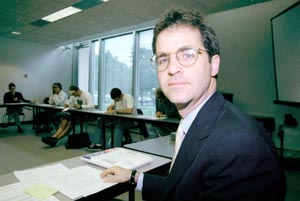Harris School students explore ‘living wage’ concept
As part of an effort to help Masters of Public Policy students understand the phenomenon of poverty around the world, faculty and students in the Irving B. Harris Graduate School of Public Policy Studies have launched a project to examine the concept of a “living wage.” Their work is based on a methodology that analyzes the basic food and shelter needs of workers and their families in various developing countries.
 Robert LaLonde |
The preliminary conclusions have been surprising. LaLonde said the findings indicate that “most big multinationals appear to pay their workers a ‘living wage’ or at least in the ballpark by the standards set in a recent National Academy of Sciences study.” “Paying 50 cents an hour might appear heartless to us, but when that puts a family in the 30th percentile of income distribution, it may mean a better standard of living compared to the alternatives,” LaLonde added.
LaLonde noted, “Income from a ‘living wage’ based on a poverty threshold for a family of five with one worker will not be sufficient for a family of 10. So a ‘living wage’ calculation does not address poverty for all households.” And multinationals usually seek semi-skilled, somewhat older workers, rather than low-skilled workers in cheap supply.
Initially spurred by an inquiry two years ago from Harris School benefactor King Harris, a masters student undertook a groundbreaking project to determine a ‘living wage’ for workers in one of Harris’ plants in China. This student tackled the question of how much multinational companies doing business in urban China should pay workers to raise their families and themselves out of urban poverty.
The success of the initial investigation led to an expanded project called “The Harris School ‘Living Wage’ Workshop,” in which 11 Master of Public Policy students participated. The students were given the opportunity to spend part of the summer in selected communities overseas, gathering data to determine the ‘living wage.’
An executive from Nike, a frequent target of criticism for conditions at its plants overseas, was given an opportunity to share the company’s policies on its international operations. He described to Harris students the ironic position of its plants in Vietnam, where their contract workers earn in the 80th percentile of the country’s income distribution. The plant attracts teachers, nurses and others who would make far less in their chosen professions. The Vietnamese government is concerned because the above-average wages paid by multinationals are drawing workers whose initial training is more urgently needed elsewhere. Governments are generally concerned that high wages in multinational plants will skew their economies and dissuade other multinationals from locating in their countries, LaLonde explained.
“We found many business people in Chicago and elsewhere extremely interested in this effort,” said LaLonde. “In the United States, there is growing focus on the concept of a ‘living wage’ for all families. It’s similar to the controversy over U.S. corporate interests in South Africa before the end of apartheid. There is a spotlight now on how U.S. and multinational corporations conduct themselves in the countries where they locate their manufacturing plants.”
King Harris and the MacArthur Foundation funded the Harris School project, while faculty members Robert Michael, Dean of the Harris Graduate School of Public Policy Studies, LaLonde and Susan Mayer, Associate Professor in the Harris Graduate School of Public Policy Studies, provided training for the students prior to their fieldwork. The professors familiarized the students with alternative measurements of poverty through economics of the ‘living wage’ and comparative standards of living throughout the world. Michael introduced the students to poverty standards established by the U.S. National Academy of Science, and LaLonde offered a foundation for understanding labor markets. Business executives, representatives of non-governmental organizations, former Harris School students and others gave the graduate students in the project varied perspectives on this complex topic.
“We wanted to expose the students to many different perspectives, because our goal was not to advocate a specific ‘living wage’ standard, but to inform the policy debate,” said LaLonde, who directed the workshop.
“Harris students dug into a country’s labor situation and helped us come up with a framework for all interested parties who want to calculate ‘living wages,’ country by country.”
The students, who provided reports on their fieldwork for evaluation last month, were assigned, whenever possible, to countries of which they were natives or native speakers. Neither the companies studied nor the governments involved were always cooperative, LaLonde noted.
“Data collection was sometimes very tough. Companies will tell you everything about their free meals, free housing, free medical care and other benefits, but they avoid revealing the specific wage rate paid to workers. Our students had to be resourceful and interview workers at the plant gate, and police would often not always allow even that informal contact.”
Reasonable standards of living for food, clothing, shelter and other personal and social necessities differ greatly from country to country.
In a temperate country like the Philippines, a basic standard for urban housing in Manila is a modest structure with a corrugated metal roof. The sun usually is the only heater required. In Sofia, Bulgaria, the cold weather dictates much greater concern about shelter and utilities.
“Our students had to try to determine a reasonable threshold of poverty in their countries and then decide on an average household structure on which that threshold would be targeted,” said LaLonde.
Though the workshop was primarily designed as a learning experience for the students, LaLonde said, “it has value for all those with an intellectual interest in poverty and the variability of living standards throughout the world as well as to those with a very practical interest in how best to meet the family needs of workers.”
![[Chronicle]](/images/small-header.gif)